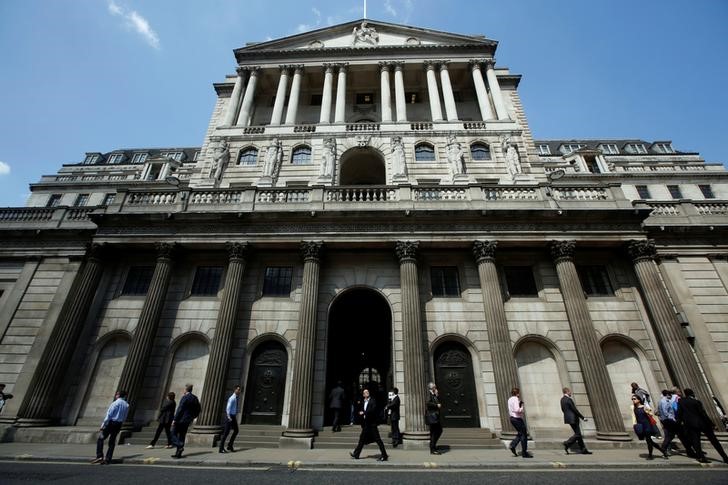 © Reuters. Pedestrians walk past the Bank of England in the City of London
© Reuters. Pedestrians walk past the Bank of England in the City of LondonBy Huw Jones and David Milliken
LONDON (Reuters) – Central London’s “fully valued” commercial property market should be a wake-up call for the sector, the newest member of the Bank of England’s Financial Policy Committee (FPC) said on Tuesday.
Elisabeth Stheeman said commercial property is used by small firms to back loans, creating a potentially large source of credit risk for banks and a threat to the wider economy if things go wrong.
While commercial real estate prices in Britain as a whole remain 13 percent below their peak in 2007, they are 22 percent above that level in central London, she said.
“To me that was really a wake-up call, in a sense they are very fully valued, to say the least,” Stheeman told parliament’s Treasury Select Committee in a hearing on her appointment.
If prices fell, small companies could see access to finance being choked off, she said.
The FPC, however, does not urgently need any extra powers to direct regulators to take action in addition to existing powers over banks’ capital levels and loan-to-income ratios on household mortgages, she said.
Stheeman has a long-standing involvement in the real estate industry. She currently serves on the supervisory boards of German and French real estate companies and is a member of the supervisory boards of German and French property companies and Germany’s real-estate focused lender Aareal Bank (DE:).
Before that, she was the chief operating officer for divisions of Morgan Stanley (N:) and Jones Lang LaSalle (N:) that were focused on real estate investment.
Brexit is the other potential risk to financial stability that should be a major focus for the FPC this year, she said.
Banks, insurers and asset managers operating in Britain are already applying for licences to work in the European Union after Britain leaves the bloc in March 2019, forcing them to decide how many people to move.
Britain is negotiating the details of a transition period to cover the period immediately after March 2019, but long-term trading relations remain unclear.
“It’s important to create some kind of certainty for firms, otherwise they may be pushed into taking decisions,” Stheeman said.
Asked if the risk of Britain leaving the EU without a deal had fallen, she said she “would hope” that was the case, adding that it was not clear that the EU – rather than Britain – would be worse off if it lost easy access to the City of London.
BoE Governor Mark Carney said last week that he believed the risk of a disorderly Brexit had fallen, and that EU firms would suffer if they could no longer arrange finance in London.
The FPC was created after the 2007-09 financial crisis in a bid to spot risks faster, before they get out of control.
But finding people to serve in senior BoE roles who do not have conflicts of interest has proven a challenge for Britain’s finance ministry. Stheeman said she would recuse herself from any FPC discussion of German or French real estate markets to avoid conflicts of interest, as well as matters affecting British government gilt issuance – such as the reversal of quantitative easing – as her husband is chief executive of the UK Debt Management Office.
Typically people with the financial industry experience needed to serve as external members of the FPC are in high demand for more lucrative non-executive roles in the financial sector. Stheeman said she wanted to “give something back” after being encouraged by the finance ministry to apply.
The BoE paid external members of the FPC were paid 92,990 pounds ($129,247) each during the last financial year.
($1 = 0.7195 pounds)
Source: Investing.com




























